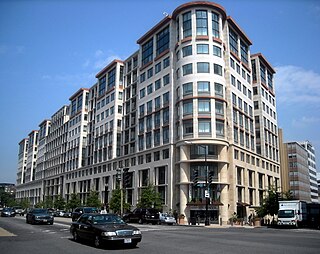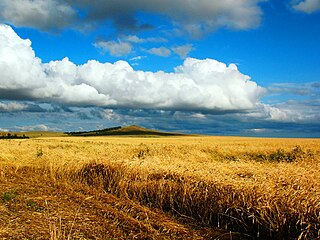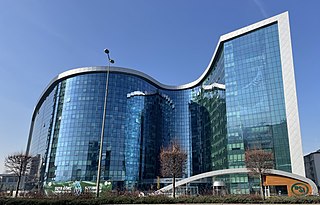The International Bank for Reconstruction and Development (IBRD) is an international financial institution, established in 1944 and headquartered in Washington, D.C., United States, it is the lending arm of World Bank Group. The IBRD offers loans to middle-income developing countries.It is the first of five member institutions that compose the World Bank Group. The initial mission of the IBRD in 1944, was to finance the reconstruction of European nations devastated by World War II. The IBRD and its concessional lending arm, the International Development Association (IDA), are collectively known as the World Bank as they share the same leadership and staff.

The International Finance Corporation (IFC) is an international financial institution that offers investment, advisory, and asset-management services to encourage private-sector development in less developed countries. The IFC is a member of the World Bank Group and is headquartered in Washington, D.C. in the United States.

The United States Department of Agriculture (USDA) is the federal executive department responsible for developing and executing federal laws related to farming, forestry, rural economic development, and food. It aims to meet the needs of commercial farming and livestock food production, promotes agricultural trade and production, works to assure food safety, protects natural resources, fosters rural communities and works to end hunger in the United States and internationally. It is headed by the secretary of agriculture, who reports directly to the president of the United States and is a member of the president's Cabinet. The current secretary is Tom Vilsack, who has served since February 24, 2021.
Agribusiness is the industry, enterprises, and the field of study of value chains in agriculture and in the bio-economy, in which case it is also called bio-business or bio-enterprise. The primary goal of agribusiness is to maximize profit while satisfying the needs of consumers for products related to natural resources such as biotechnology, farms, food, forestry, fisheries, fuel, and fiber.

The Financial Institutions Reform, Recovery, and Enforcement Act of 1989 (FIRREA), is a United States federal law enacted in the wake of the savings and loan crisis of the 1980s.

Agriculture in Kazakhstan remains a small scale sector of Kazakhstan's economy. Agriculture's contribution to the GDP is under 10% - it was recorded as 6.7%, and as occupying only 20% of labor. At the same time, more than 70% of its land is occupied in crops and animal husbandry. Compared to North America, a relatively small percentage of land is used for crops, with the percentage being higher in the north of the country. 70% of the agricultural land is permanent pastureland.

The Louisiana Department of Transportation and Development (DOTD) is a state government organization in the United States, in charge of maintaining public transportation, roadways, bridges, canals, select levees, floodplain management, port facilities, commercial vehicles, and aviation which includes 69 airports, in the U.S. state of Louisiana. The agency has approximately five thousand personnel on staff and an operating budget of $2.3 billion. DOTD operations are run through nine district offices across the state.

The Department of Finance is a key ministry that manages the state finances and economy of the State of Kerala. The department is headed by a senior minister who has cabinet ranking as per Indian Cabinet Protocol Laws. The state assembly rules of 1966 ranks the department and its minister as number 3 in official rankings after Chief Minister and Opposition Leader.
The College of Economics and Management (CEM) is one of the eleven degree-granting units of the University of the Philippines Los Baños. It is the first in Asia to offer degree programs in Agricultural Economics and has trained agricultural, resource and environmental economists from all over the continent.

The Financial Supervisory Service (FSS) is South Korea's integrated financial regulator that examines and supervises financial institutions under the broad oversight of the Financial Services Commission (FSC), the government regulatory authority staffed by civil servants.
Drinking water supply and sanitation in Egypt is characterized by both achievements and challenges. Among the achievements are an increase of piped water supply between 1998 and 2006 from 89% to 100% in urban areas and from 39% to 93% in rural areas despite rapid population growth; the elimination of open defecation in rural areas during the same period; and in general a relatively high level of investment in infrastructure. Access to an at least basic water source in Egypt is now practically universal with a rate of 98%. On the institutional side, the regulation and service provision have been separated to some extensions through the creation of a national Holding Company for Water and Wastewater in 2004, and of an economic regulator, the Egyptian Water Regulatory Agency (EWRA), in 2006. , many challenges remain. Only about one half of the population is connected to sanitary sewers. Partly because of low sanitation coverage about 50,000 children die each year because of diarrhea. Another challenge is low cost recovery due to water tariffs that are among the lowest in the world. This in turn requires government subsidies even for operating costs, a situation that has been aggravated by salary increases without tariff increases after the Arab Spring. Poor operation of facilities, such as water and wastewater treatment plants, as well as limited government accountability and transparency, are also issues.
The Austria Wirtschaftsservice Gesellschaft (aws) is an Austrian federal development and financing bank for the promotion and financing of companies. The bank provides around €1 billion (2008) in development aid, mainly as grants, loans and guarantees to finance projects in the value of almost €11 billion (2008). aws is focused on four different areas: Technology and innovation, equity and capital markets, promotion and financing as well as services for research and development management. In addition to these core activities it also administers the Austrian federal economic stimulus package of around €1 billion in 2009 and 2010. According to the OECD, Austria’s total official development assistance (ODA) increased in 2022 due to an increase in in-donor refugee costs. It represented 0.39% of gross national income (GNI).

The Food, Agriculture, Conservation, and Trade (FACT) Act of 1990 — P.L. 101-624 was a 5-year omnibus farm bill that passed Congress and was signed into law.
The Haiti economic reforms of 1996 were designed to rebuild economy of Haiti after significant downturns suffered in the previous years. The primary reforms were centered on the Emergency Economic Recovery Plan (EERP) and were followed by budget reforms.

Water supply and sanitation in Turkey is characterized by achievements and challenges. Over the past decades access to drinking water has become almost universal and access to adequate sanitation has also increased substantially. Autonomous utilities have been created in the 16 metropolitan cities of Turkey and cost recovery has been increased, thus providing the basis for the sustainability of service provision. Intermittent supply, which was common in many cities, has become less frequent. In 2004, 61% of the wastewater collected through sewers was being treated. In 2020 77% of water was used by agriculture, 10% by households and the rest by industry.
Fiscal policy are "measures employed by governments to stabilize the economy, specifically by manipulating the levels and allocations of taxes and government expenditures". In the Philippines, this is characterized by continuous and increasing levels of debt and budget deficits, though there were improvements in the last few years of the first decade of the 21st century.
The College of Natural Resources and Environment at Virginia Tech contains academic programs in forestry, fisheries, wildlife sciences, geography, and wood science. The college contains four departments as well as a graduate program in the National Capital Region and a leadership institute for undergraduates.

Due to the common occurrence of hurricanes in the coastal state of North Carolina, hurricane recovery in North Carolina is a large component of the state's emergency management efforts. Recovery from these tremendous storms at the local and state level is a large part of the aftermath of a hurricane. Gavin Smith and Victor Flatt stated that "Disaster recovery remains the least understood aspect of hazards management, when assessed relative to preparedness, response, and hazard mitigation." Smith and Flatt also went on to state that the role of the states is even less understood. The review of the plans and policies that instruct recovery, agencies involved, funding processes and budgets, and the environmental effects of a hurricane creates a better understanding of how North Carolina recovers from a hurricane.
A green bank is a financial institution, typically public or quasi-public, that employs innovative financing techniques and market development tools in collaboration with the private sector to expedite the deployment of clean energy technologies. Green banks use public funds to leverage private investment in clean energy technologies that, despite their commercial viability, have struggled to establish a widespread presence in consumer markets. Green banks aim to reduce energy costs for ratepayers, stimulate private sector investment and economic activity, and expedite the transition to a low-carbon economy.
Primary Industries and Regions SA (PIRSA), also known as Primary Industries and Regions South Australia, and the Department of Primary Industries and Regions SA, is an agency of the South Australian Government whose focus is the economic development of the state of South Australia. Its key areas of work include primary sector industries, and biosecurity.








